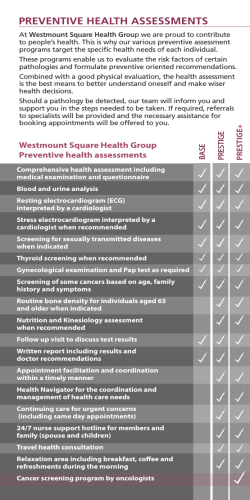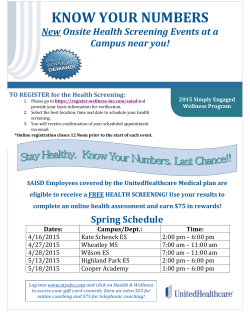
Framingham Heart Study
EpiScania Symposium Medicon Village, Lund 2nd September 2015 The birth of the population-based cohort studies in preventive medicine From Framingham to Värmland Peter M Nilsson, MD, PhD Department of Clinical Sciences Lund University University Hospital, Malmö Sweden Framingham Heart Study - since 1948 First headquarters Screening in three generations Framingham Heart Study Started in 1948 Offspring Study in 1971 Third generation in 2002 FHS – generation 1: n= 5209 FHS - generation 2: n= 5124 FHS – generation 3: n= 4095 (2005) ”Framingham Offspring Study” >350 publications Focus on cardiovaskular risk, genetics and biomarkers Gunnar Jungner 1914 – 1982 Swedish engineer, visited the US in 1950´ies Mobile x-ray screening for tuberculosis X-ray device Bus for screening 1955 Bror Rexhed 1914 – 2002 Director ”Medicinalstyrelsen” Tage Erlander 1901 - 1985 Swedish Prime Minister The Värmland Health Survey • Sweden´s first large population-based screening study was carried out in the county of Värmland by initiative of ”Medicinalstyrelsen” during 1962 to 1965 • In total, 97,000 subjects came to the health screening (76% of all invited) • Simple physical examination done. Blood samples sent on the night-train from Karlstad to Stockholm for further analyses in the new multi-analysator (Ingmar Jungner) • Follow-up after 20 years (Gunnar Lindberg, LU, Sven Törnberg, KI), and 40 years (Payam Khalili, ÖU) Development of new technologies for large screening studies during 1960´ies Device for automatic blood analysis. Värmland Health Survey 1962 Ingmar Junger, Lab, Stockholm Device for analog-digital transformation, as well as automatic Evaluation and statistics. Värmland Health Survey 1962 ”Men born in 1913” Gösta Tibblin 1929-1997 Göteborg Tibblin G. High blood pressure in men aged 50 - a population study of men born in 1913. Acta Med Scand (Suppl.) 1967;470:1-84. Uppsala Longitudinal Study of Adult Men (ULSAM), n= 2300 Bertil Hood 1917-1991 Malmö Preventive Project (MPP), n= 33,000 Berglund G, Nilsson P, Eriksson KF, Nilsson JA, Hedblad B, Kristenson H, Lindgärde F. Long-term outcome of the Malmö preventive project: mortality and cardiovascular morbidity. J Intern Med. 2000 Jan;247(1):19-29. The Malmö Preventive Project (MPP) Age-cohorts at baseline screening in the MPP cohort Women Age Men Age Baseline screening in 1974-1992, included 22,000 middle-aged men and 11,000 women (attendance rate 72%). Follow-up in national registers is possible for 25-30 years in most subjects. Berglund G, et al. 1996, 2001, Nilsson P, et al. 2002, 2003, 2004 MGR FOB: Folk- och Bostadsräkningen (Population censuses, for social data) MGR: Multi-generational Register (for finding first-degree relatives) PKU Register and Biobank Started in 1975, kept at Karolinska Hospital, Stockholm Discovery of Legionella bacteria in 1977 Biobanking Work Processes deCODE Genetics Inc. - Iceland Kári Stéfansson deCODE Genetics Inc. was founded in 1996 to identify human genes associated with common diseases using population studies, and apply the knowledge gained to guide the development of candidate drugs In December 2012, deCODE Genetics was purchased by Amgen Biobanking past, present and future: responsibilities and benefits University of California, San Francisco AIDS Specimen Bank - Deposits and Withdrawals December 1982-August 2012. De Souza YG, et al. AIDS. 2013;27:303-12. UK Biobank Prospective Cohort • 500,000 UK men and women aged 40-69 years when recruited and assessed during 2006-2010 • Extensive baseline questions and measurements, with stored biological samples (and opportunities to add enhanced assessments in large subsets) • Repeat assessments over time in subsets of the participants to allow for sources of variation • General consent for follow-up through all health records and for all types of health research • Sufficiently large numbers of people developing different conditions to assess causes reliably Locations of UK Biobank assessment centres around the UK (with people recruited from urban and rural areas) UK Biobank: 500,000 participants aged 40-69 recruited in 2007-10 Age Gender Deprivation 40-49 119,000 50-59 168,000 60-69 213,000 Male 228,000 Female 270,000 More 92,000 Average 166,000 Less 241,000 Generalisability (not representativeness): Heterogeneity of study population allows associations with disease to be studied reliably Newer Swedish population-based studies with associated biobanks • Lifegene (KI) 0-45 years • EpiHealth cohort (UU, LU) 45-75 years • SCAPIS (HLF) CV, lung • Malmö Offspring Study (LU) Family patterns • BIG-3 (RS) Smoking and risk Microbiota and its consequences for health - Metabolism Obesity Immunology Vascular function A link to early life colonization of the GI tract of newborns during delivery Tremaroli, Bäckhed Nature 2012; 489:242–249 Summary The first large-scale population-based screening study was the Framingham Heart Study (FHS), started in 1948 In Sweden, the Värmland Health Survey in 1962 and the “Men born in 1913” in 1963 were two of the first large epidemiological studies The first biobanks added to large studies was the Malmö Preventive Project 1974-1992 and the ULSAM study in Uppsala New technologies, registers for follow-up and a high attendance rate were important aspects of the early studies in Sweden The PKU register was an early national biobank initiative (1975) PN 2015
© Copyright 2025










